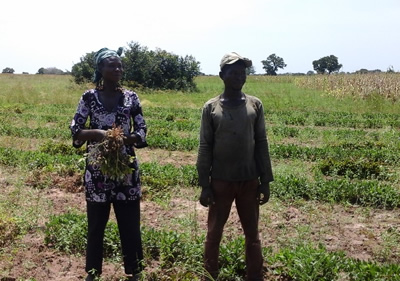Learning from SPRING/Ghana’s Farmer Field School

Photo credit: SPRING/Ghana
Adopting Better Methods
As a farmer in Kutabongu community in Ghana’s Upper East Region, Awine Azaghizo has always used traditional farming methods to cultivate groundnuts. Recently, however, he’s had trouble clearing weeds from his crops and has noticed a low crop yield. Mr. Azaghizo’s farm sits near one of SPRING/Ghana’s model farmer field school (FFS) demonstration plots in the Fedrugo community. After observing how successful the FFS plots were Awine—who is not an FFS member—began to emulate their methods in his own fields, with wonderful results.
Raising More Nutritious Crops
SPRING/Ghana’s FFS trainings educate farmers about how to improve pre-harvest agronomic practices and post-harvest handling. Just as the FFS farmers were taught, Awine started visiting his crops more often, turning groundnut shoots upright to facilitate drying during harvesting, and planting his crops in rows. These improved methods not only make it easier for farmers to care for crops, they also reduce or prevent aflatoxin contamination.
Aflatoxins are naturally produced by fungi. Contamination occurs when groundnut pods are damaged in the field, when harvesting is delayed, and when pods are exposed to high moisture levels during storage. Aflatoxin-contaminated foods are unsuitable for sale and for human consumption because they negatively impact health. For example, frequent exposure and consumption of even low levels of aflatoxincontaminated foods causes liver cancer and can suppress the immune system. Medical experts also suspect an association between aflatoxin exposure and child growth stunting. Unfortunately, aflatoxins are nearly impossible to detect without special testing, so farmers must rely on using proper growing, harvesting, and handling methods to avoid contamination.
Advocating for Improved Methods
Although Awine doesn’t work directly with SPRING/Ghana, he is now a strong advocate of the FFS farming approach, and has encouraged his wife to adopt these improved practices. He also plans to work with other members of his community to teach them about how they can improve their farming methods, increase yields, reduce aflatoxin contamination and, as a result, raise healthier, more nutritious crops.
I have observed that when all these good practices are adopted, they have shown great benefits.
--Mr. Awine Azaghizo, farmer
One of SPRING/Ghana’s objectives is to increase demand for high-impact nutrition practices and services. Awine’s enthusiasm for FFS methods is helping create a positive environment for the new processes taught at FFS plots. SPRING/Ghana was impressed by Awine’s initiative because he independently instituted these improvements to his fields. By adopting the new methods, Awine reinforced the message FFS trainers share with communities in Ghana’s Upper East Region.
“I have observed that when all these good practices are adopted they have shown great benefits. I have seen an increase in my yield as compared to previous years. Even planting the groundnuts in rows made it easier for clearing weeds and to uproot them for drying during the harvest time,” Awine said.
Awine’s improved fields are proof that SPRING/Ghana’s straightforward FFS methods can have a spillover effect and be adopted by anyone who wants to improve his or her family’s nutrition and agriculture.
Since February 2015, SPRING/Ghana has enrolled over 6,000 farmers in 150 communities throughout our 15 target districts in the FFS initiative. During the training, agricultural extension officers from the Ministry of Food and Agriculture (MoFA) teach small groups of farmers methods for reducing aflatoxins, by making good beds, planting seeds properly, and handling groundnuts safely; these practices have the added benefit of reducing pest infestation and resulting in higher yields.